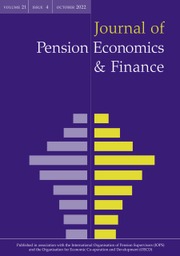Article contents
Pension reform, savings behavior, and capital market performance
Published online by Cambridge University Press: 09 May 2005
Abstract
This paper shows that the capital market effects of population aging and pension reform are particularly strong in continental European economies such as France, Germany, and Italy. Reasons are threefold: these countries have large and ailing pay-as-you-go public pension systems, relatively thin capital markets and less than benchmark capital performance. The aging process will force the younger generations in these countries to provide more retirement income through own private saving. Capital markets will therefore grow in size and active institutional investors will become more important as intermediaries. The aim of this paper is to show that these changes are likely to generate beneficial side effects in terms of improved productivity and aggregate growth.
- Type
- Issues and Policy
- Information
- Copyright
- © 2005 Cambridge University Press
- 11
- Cited by




